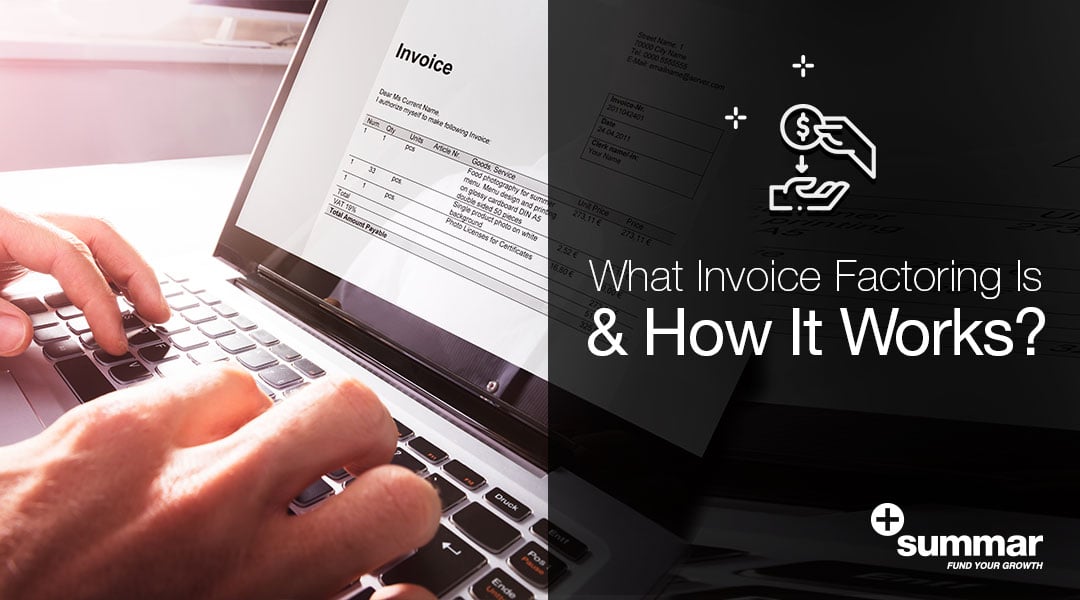
Have you ever considered invoice factoring in the moments you have required fast and secure funding? Invoice factoring is a type of financing that converts outstanding invoices due within a given amount of days into immediate cash for your small business, reducing payment periods and improving your reaction capacity. Check out how this service works and why it is the best option for your company.
How Invoice Factoring Works in 5 Steps
Step 1: Invoice Your Customer
Once you have provided products or services to your B2B or B2G customer, you issue an invoice with payment terms, which will delay their payments and hinder your cash flow. With these invoices, you can qualify for a factoring program with Summar that will accelerate their payouts.
Step 2: Complete the application process and start selling your outstanding invoices.
Summar will run some research that will allow you to know your clients' credit risk level in detail. We will send you a proposal with the ideal terms of factoring, according to your business's characteristics and this qualification.Step 3: Sell & Assign the Invoice to Summar
Summar will give you an initial advance for up to 90%, called an advance rate. The amount of your advance depends on the size of your transaction, your industry, and other risk parameters.
We issue a Notice of Assignment to notify your client that Summar will receive the pending payment. All payments will go to a lockbox account (a designated account for the factored invoices to be paid), set up by us.
Step 4: Your Client Pays Summar
We will be a partner in your collection process, following your history of techniques. When your client makes the payment according to the invoice terms, it will go directly to Summar.
Step 5: Summar Forwards You the Remaining Balance (Minus Fees)
After receiving payment from your client, Summar will give you the remaining balance of the invoice, called the reserve amount, minus its fee.
Is Invoice Factoring Right for You?
Invoice factoring is right for capital-intensive businesses needing consistent cash flow. If you choose invoice factoring, you'll bring a partner into your business to support your risk evaluations, accounts receivable management, and collections process. Keep reading to check out some pros and details you must consider!
Pros of Invoice Factoring
- No Credit Score Requirement: With invoice factoring, what matters the most is your customer's creditworthiness. This means you're able to get financing even if you have poor credit.
- You Get to Work with AR Experts: Since this is what we do daily for over 16 years, you might benefit from our techniques and expertise.
- Quick Source of Cash: You can typically get approved within five days and funded in one day.
How to Qualify for Invoice Factoring
Qualifying for invoice factoring is easier than qualifying for long-term financing. Credit scores, annual revenues, and profitability can be significant hurdles in other financing options, but in invoice factoring, the relevant credit score is your client's. Consequently, you can apply if your customers meet their payments on time. If you meet these requirements and your company does not have any current legal or tax problems, you are the perfect candidate for our services!
Invoice Factoring Costs
The base cost of an invoice factor depends mainly on two aspects:
- Discount Rate (or Factor Rate): The discount rate is the primary cost of borrowing money from a factor and is typically charged weekly or monthly. Summar has a tiered system for its discount rates, so the more you factor in a month, the lower your discount rate is.
- Length of Factoring Period (the time it takes your customer to pay): Discount rates are charged regularly (usually weekly or monthly). So, the length of time it takes for the customer to pay your invoice will also determine your cost.
Learn more: Factoring: A Way of Minimizing Risk From Your Investments
Recourse vs. Non-Recourse Factoring
One of the most important concepts to understand when considering invoice factoring is recourse factoring vs. non-recourse factoring.
Recourse factoring means that the factor has the right to collect payment from you if your customer doesn't pay the invoice within a reasonable time after its due date.
Non-recourse factoring is when the factor accepts the risk that the customer won't pay. In this case, even if your customer doesn't pay the invoice on time, your business won't be on the hook for it. At Summar, we offer non-recourse factoring.
Why applying for a factoring program with Summar?
When you decide to trust Summar, you count on a new partner who worries about your finances' health just like you. You'll obtain an added value that will surely help you level up.
At Summar, we have turned our +16 years of experience in factoring into products that allow us to put ourselves in our clients' position and offer real, practical, and safe solutions that benefit their cash flow without any hassle. Understanding your purpose makes us know the best way to boost your growth from your finances' management.
Through an unbeatable credit guarantee, we can assure you that your money will always be safe. Our truly non-recourse program will be the perfect solution to protect you against unfamiliar situations. Also, with benefits such as the direct support of an account executive who will understand how and when you require your payments and the support of more than 1,000,000 funded invoices, we can confirm that our solution is like no other.
Factoring is your best choice!
Easy and fast funding makes invoice factoring with Summar a pivotal option to enable your company's growth. If you have clients with a high credit score and need to improve your cash flow without affecting your company's creditworthiness, there is no better option. Contact us and discover more!

